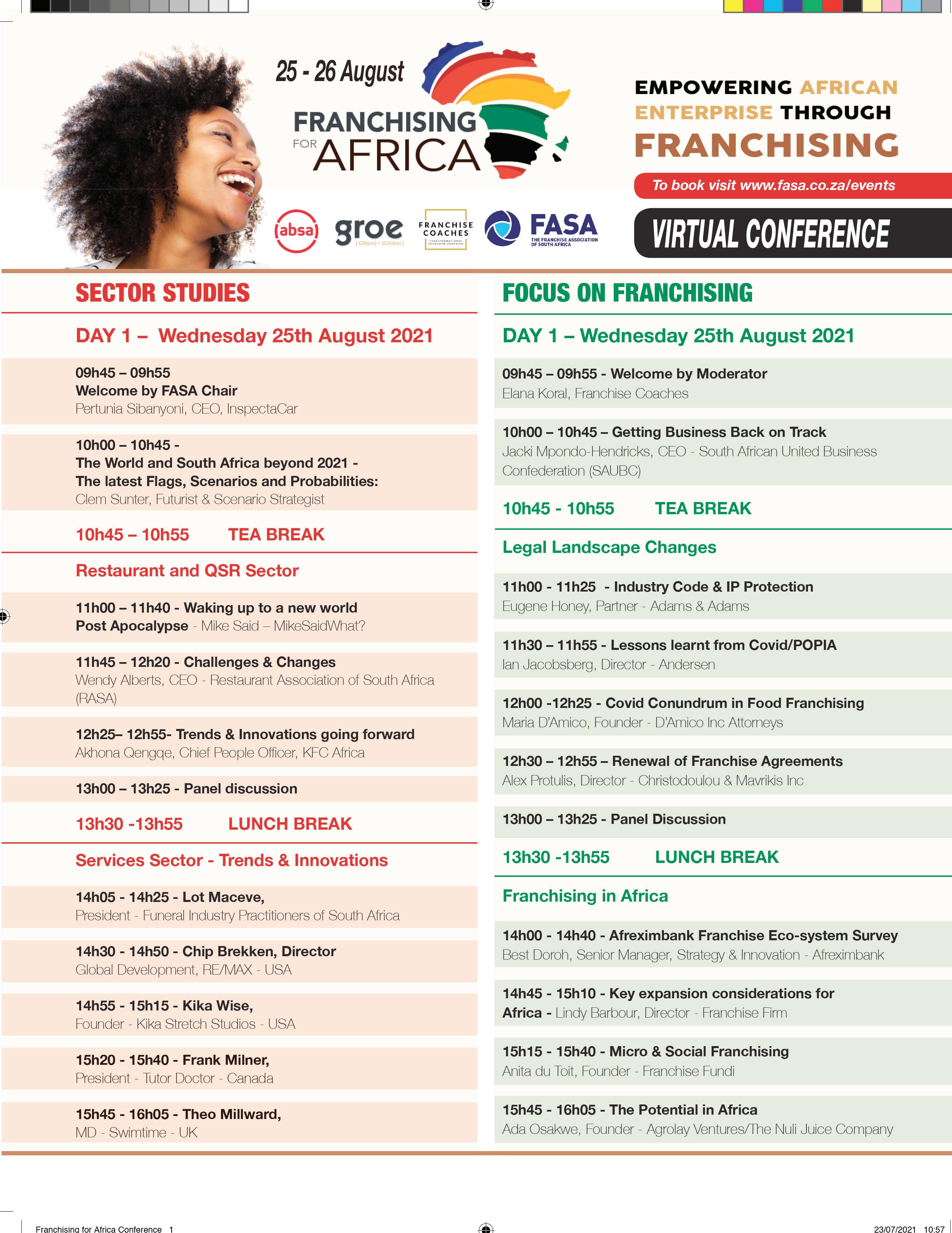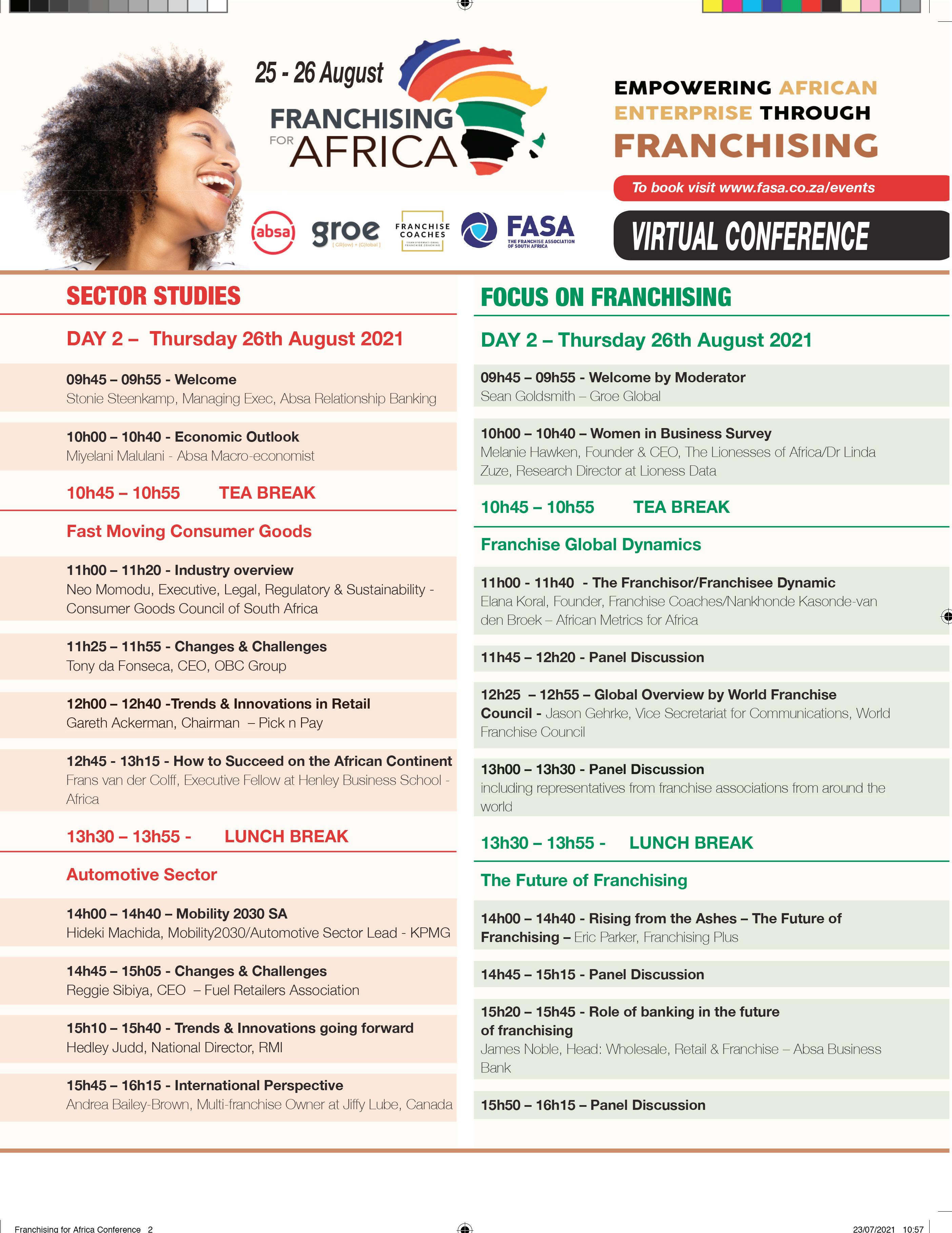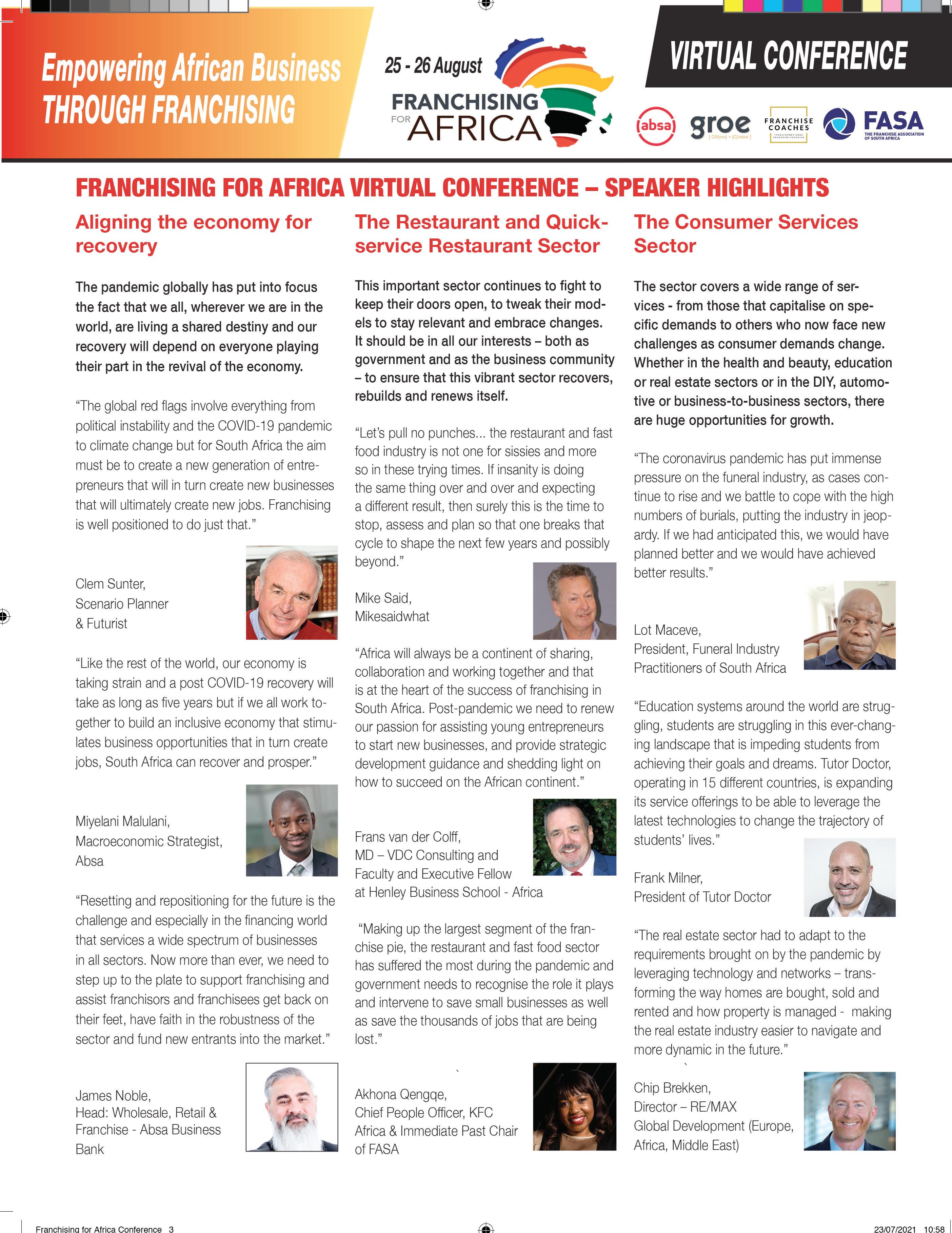
7 minute read
Industry

Franchising could play an important role in much-needed post-pandemic economic recovery, yet insiders believe government support for the sector is lacking. Anita du Toit, franchise development consultant and director of Franchise Fundi, says: “The lack of specifi c programmes supporting franchising indicates that government doesn’t emphasise the sector’s role in economic development. Franchises are more sustainable than start-ups and economically more viable than subsistence businesses. The fact that the major commercial banks all have franchise divisions focused on funding the sector indicates that this is a strong one commercially.”
Though there are several programmes that support small, micro and medium enterprises (SMMEs), the only direct support for franchises from government comes from the Small Enterprise Finance Agency (SEFA) within the Department of Small Business Development, adds du Toit. “They are seemingly the only government agency with a clear focus on franchising, though the National Empowerment Fund (NEF) does provide some franchise funding under its iMbewu fund, and other initiatives provide transformation-focused fi nancing.”

LOOK FOR SUPPORT OUTSIDE OF GOVERNMENT
Still, for those looking for support, the best route is often through other institutions, du Toit adds. “SEFA is a member of the Franchise Association of South Africa (FASA) and has signed a memorandum of understanding (MoU) with the association to assist franchisees applying for fi nance.
“It’s not always clear what SEFA’s requirements are, but it’s worth it for applicants to contact FASA because of the MoU that is in place,” explains du Toit. “Another alternative is to speak to commercial banks about government funding and guarantee schemes, as some of them co-operate with these agencies to facilitate fi nance.”

GROWING
THE INDUSTRY
The franchising sector is a missed opportunity for transformation, job creation, economic recovery and skills development, writes DELIA DU TOIT
There is no government master plan for the sector and no programmes that leverage its admirable track record when it comes to job creation and skills transfer. According to FASA, the sector employed close to half a million people in 2019 in over 800 franchise systems with around 48 000 outlets.
“Franchises promote job creation and skills transfer in a country burdened by severe unemployment and skill shortages, yet franchisees face cumbersome laws and red tape,” says du Toit.
Shenelle Nair, engagement manager at management consulting and investment fi rm Letsema, says relaxing regulatory and market access barriers will be essential for growth in the sector. And the numbers are there to back up such a drive. “Around 70 per cent of businesses fail within their fi rst two years of operation, while the franchising failure rate is Anita du Toit estimated to be as low as 10 per cent.”
LAWS AND RED TAPE.” – ANITA DU TOIT, FRANCHISE DEVELOPMENT CONSULTANT, FRANCHISE FUNDI

TRANSFORMING THE SECTOR
Shenelle Nair, engagement manager at management
consulting and investment fi rm Letsema, says transformation concerns have been raised in the past by some development fi nance institutions involved in franchise funding, like the National Empowerment Fund (NEF). “These institutions believed that black-owned companies were being given bad franchise sites or testing sites, resulting in their high business failure rate.
“Franchising has been perceived negatively by government on the basis that there are links to international brands with limited local black ownership. However, a study by Sanlam indicated that historically disadvantaged individuals own 28 per cent of franchises, and women own 39 per cent. Furthermore, more than 80 per cent of franchises are local brands, showing that the sector has a largely positive impact on the local economy.”
Shenelle Nair
Key takeaways from the 2021 Budget
DELIA DU TOIT fi nds out what small businesses really need from government
While businesses across the spectrum watched the budget speech early this year with bated breath, it did little to reassure the franchising industry of future support. Viresh Harduth, vice president of small business at Sage Africa and Middle East, says that the budget lacked focus on the small business sector. “After the president spoke extensively about supporting small businesses and driving investment in the State of the Nation Address, it was disappointing that Finance Minister Tito Mboweni did not add more details. We were hoping to hear more about how government will overhaul the electricity supply market, drive affordable broadband for small businesses and accelerate digital transformation in government.”
The Department of Small Business Development did, however, allocate R4-billion to township and rural enterprises – though little detail was given about how this would be allocated.
The one percentage point reduction in corporate income tax is also not likely to make much of a difference to SMMEs, says Harduth. “Given that South Africa has a relatively high corporate tax rate, the reduction is welcome; however, it seems likely that larger enterprises will benefi t more from this tax reduction than smaller businesses. Many of these companies are one-person operations where the owner extracts most of the income through loans and salaries – most small businesses in South Africa are not running at a profi t. For them, welltargeted grants, less red tape and a focus on reducing other

Viresh Harduth
DID YOU KNOW?
SMMEs contribute 20 per cent to gross domestic product (GDP) on average, says Shenelle Nair of Letsema. The franchising sector generated around 15.3 per cent of GDP in 2017, ranking it in the top fi ve worldwide based on output as a percentage of GDP, reports FASA. In 2018, this fi gure was at 15.7 per cent (R721-billion), though it dropped to 13.9 per cent in 2019.
taxes such as the fuel levy might move the needle more effectively than a modest income tax cut.”
Another important relief measure for SMMEs, Harduth believes, would be to raise the VAT registration threshold that requires businesses to register for VAT when they reach a turnover of R1-million. “This threshold has remained unchanged for years. Raising it could relieve many small business owners of an admin headache and free their time to focus on growing their businesses instead.”
Yet transformative support is lacking. “Government support is usually (only) offered in the form of funding, with the franchisor being responsible for training and other forms of support,” says Nair. “Rather, FASA serves the purpose of protecting, lobbying, promoting and developing ethical franchising across all sectors in Africa, with specifi c focus on transformation.”
FUNDING OPTIONS
The NEF’s franchising loans, however, are transformative in nature. Criteria include that the franchise must have at least 50.1 per cent B-BBEE shareholding and active management by the B-BBEE parties. Loans are limited to R10-million, with prime-linked interest rates over fi ve to seven years.
Other fi nancing schemes that focus on empowerment include government’s Isivande Women’s Fund, which focuses on female empowerment and targets businesses that are starting up, expanding, rehabilitating or franchising; and the Umsobomvu Youth Franchise Fund from the National Youth Development Agency, which targets the youth to assist with startup and operational funding through loans.
Still, access can be a challenge, says Nair. “Support exists for SMMEs and franchises, but the processes are usually cumbersome and require several documents for application. The upfront costs are also more exorbitant for franchises than SMMEs, as fi nancial institutions often seek a minimum contribution of at least 50 per cent of the initial loan amount – a signifi cant barrier to entry.”
Removing such barriers and supporting previously disadvantaged individuals who might not have such capital upfront could improve transformation. “Franchises create a springboard for growth as there is a fairly strong support system in place from the onset,” says Nair. “Positive brand associations, an established customer base, marketing, head offi ce support, fi nancial track records, effective systems and training are further enablers for growth. Ultimately, the risks of entering franchising opportunities are much lower than starting a new business.”







